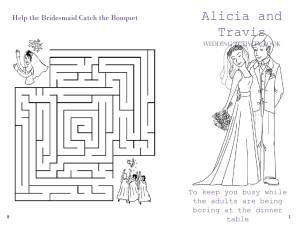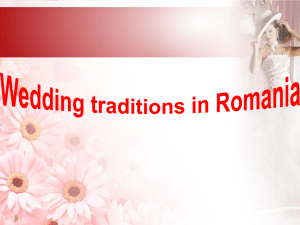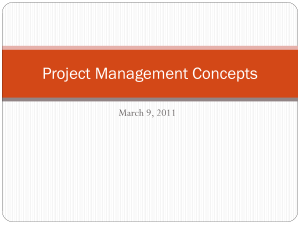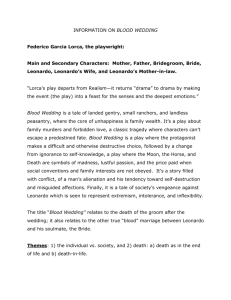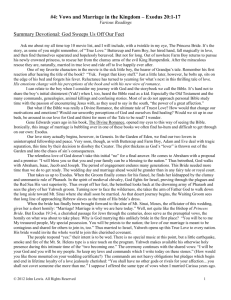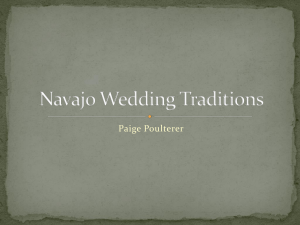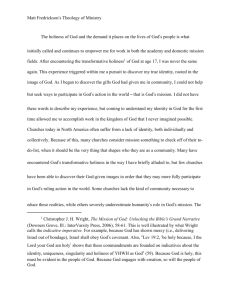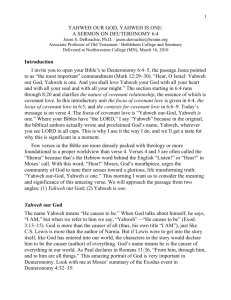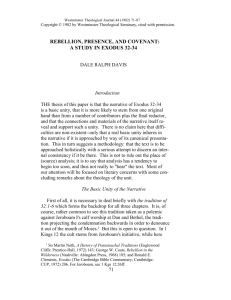Passage Retelling - Kingdom Story Ministries
advertisement
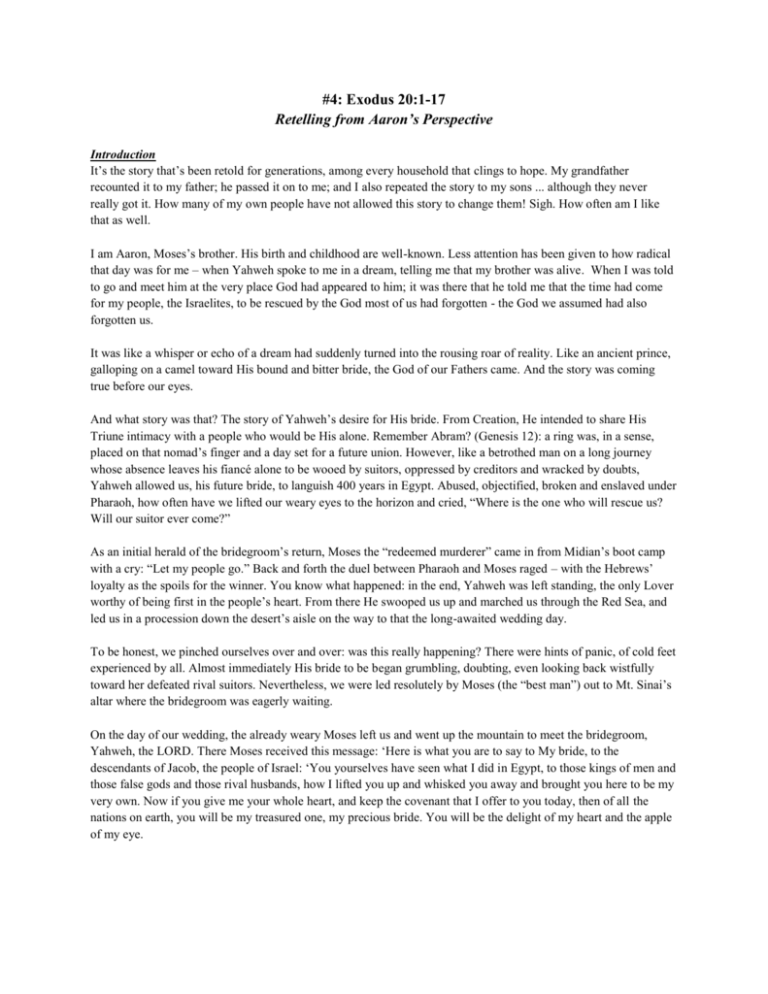
#4: Exodus 20:1-17 Retelling from Aaron’s Perspective Introduction It’s the story that’s been retold for generations, among every household that clings to hope. My grandfather recounted it to my father; he passed it on to me; and I also repeated the story to my sons ... although they never really got it. How many of my own people have not allowed this story to change them! Sigh. How often am I like that as well. I am Aaron, Moses’s brother. His birth and childhood are well-known. Less attention has been given to how radical that day was for me – when Yahweh spoke to me in a dream, telling me that my brother was alive. When I was told to go and meet him at the very place God had appeared to him; it was there that he told me that the time had come for my people, the Israelites, to be rescued by the God most of us had forgotten - the God we assumed had also forgotten us. It was like a whisper or echo of a dream had suddenly turned into the rousing roar of reality. Like an ancient prince, galloping on a camel toward His bound and bitter bride, the God of our Fathers came. And the story was coming true before our eyes. And what story was that? The story of Yahweh’s desire for His bride. From Creation, He intended to share His Triune intimacy with a people who would be His alone. Remember Abram? (Genesis 12): a ring was, in a sense, placed on that nomad’s finger and a day set for a future union. However, like a betrothed man on a long journey whose absence leaves his fiancé alone to be wooed by suitors, oppressed by creditors and wracked by doubts, Yahweh allowed us, his future bride, to languish 400 years in Egypt. Abused, objectified, broken and enslaved under Pharaoh, how often have we lifted our weary eyes to the horizon and cried, “Where is the one who will rescue us? Will our suitor ever come?” As an initial herald of the bridegroom’s return, Moses the “redeemed murderer” came in from Midian’s boot camp with a cry: “Let my people go.” Back and forth the duel between Pharaoh and Moses raged – with the Hebrews’ loyalty as the spoils for the winner. You know what happened: in the end, Yahweh was left standing, the only Lover worthy of being first in the people’s heart. From there He swooped us up and marched us through the Red Sea, and led us in a procession down the desert’s aisle on the way to that the long-awaited wedding day. To be honest, we pinched ourselves over and over: was this really happening? There were hints of panic, of cold feet experienced by all. Almost immediately His bride to be began grumbling, doubting, even looking back wistfully toward her defeated rival suitors. Nevertheless, we were led resolutely by Moses (the “best man”) out to Mt. Sinai’s altar where the bridegroom was eagerly waiting. On the day of our wedding, the already weary Moses left us and went up the mountain to meet the bridegroom, Yahweh, the LORD. There Moses received this message: ‘Here is what you are to say to My bride, to the descendants of Jacob, the people of Israel: ‘You yourselves have seen what I did in Egypt, to those kings of men and those false gods and those rival husbands, how I lifted you up and whisked you away and brought you here to be my very own. Now if you give me your whole heart, and keep the covenant that I offer to you today, then of all the nations on earth, you will be my treasured one, my precious bride. You will be the delight of my heart and the apple of my eye. Though all the earth belongs to me, you will have the most special place—at my side; you will speak for me to all the world and remain set apart, my unique treasure in all the earth.” These are the words you are to convey to my bride. When Moses descended the mountain, he first enlisted me, and then together we communicated these same words to Israel. When she had accepted the terms of the proposal, the preparations for the final wedding covenant began. The people of Israel, God’s bridegroom, had to be cleaned and wear unsoiled clothes. Everything was to be perfect for the bridegroom’s arrival and the wedding day. And what a dramatic walk down the aisle by our bridegroom God – amidst lightning and thunder and a shuddering earthquake. Moses and I went up before God to receive from Him the Words of a covenant between God and the Israelites. These words would be our wedding vows, spoken first by the Divine Groom and to be received by Israel, His bride. How did a Holy God make His divine intentions easily understood to this stiff-necked people? He employed and modified a well-known format that conquering nations in our days used after defeating their enemies, and gave us in the end the famous Ten Words (or Ten Commands as many have called them). The Story In the first of these ten words, God begins as all conquering kings did – by telling us who He is and what He had done to deserve our loyalty (formally called a preamble and historical prologue): “I am the LORD, the God of your fathers and your long-awaited Husband; who rescued you from slavery and brought you out of the land of Egypt to be my very own.” Then this same rescuing and mighty God makes His plan and commands clear to us. These are natural responses to His awesome power and His loving-kindness toward us His people. These nine commands are not suggestions or options for those wishing to commit themselves to God as He clearly delineated principles for both our relationships with Him and with each other. These relationships were given prominence as these commands provided a clear roadmap for precepts to guide and protect us in our new life together. The first command of ultimate loyalty is the most important and overarching of all the commands: You are now in relationship with ME and you are mine, so no other god can have priority over me in your life. Do not craft or conjure up any image or false copy from any part of the created world that might represent another god or that might represent me. Do not worship or serve such idols for I am your husband now and I am jealous for your love. For judgment and for your good, I will punish you and your children if you are unfaithful to me. However, if you are faithful in love, keeping my covenant and my commandments, then I will show loving-kindness to you and your children forever. Then there are two more sub-commands, related primarily to our loyalty to God: You shall not misuse, take for granted, or use flippantly my name, the name of the LORD your God; I will not leave unpunished those who treat our holy relationship so callously. Remember the Sabbath day and set it apart from the other days of the week. You should work hard for six days, fulfilling all your responsibilities, but the seventh day is a day to rest in my love, to remember that I provide all things for you, and trust in my care. On this day you are not do any of your normal work – and this goes for everyone: you, your kids, your male and female servants, even the cattle and the foreigner who is living with you. For in six days I created the universe, forming and filling the earth, the sea and everything else; but I rested on the seventh day. So, since you are made in My image, you too are to rest. This Sabbath day is therefore set apart and blessed. Now God gives six sub-commands where our loyalty to Him would be reflected by how we treat each other and our neighbor: Give honor to your father and your mother, that your life may be rich and long and marked by shalom in the land which I, the Lord your husband, will give to you. You shall not strip away the life that I have given to another through murder. You shall not dishonor our spiritual union by committing adultery and breaking the physical union present in your human marriages. You shall not take something from another that is not yours. You shall not dishonor truth or your neighbor by speaking untruth of any kind against others. You shall not gaze hungrily at your neighbor’s house, nor his possessions, his wife, his servants, or his animals – wanting them for yourself. Do not covet anything that belongs to your neighbor. Conclusion Though trembling and fearful, we accepted these words of covenant. As in all traditional treaty ceremonies, our new covenant with God was then ratified with slain animals and blood on an altar – and with the stipulations carefully written out, one copy for each party. This was completed, with God writing the 10 Words on two stone tablets. We all publically declared: “Yes, we believe Yahweh is our God and did save us from the gruesome hands of the Egyptians. Yes, we will commit to renewing this vow with every generation of our descendants.” After our public commitment, Yahweh, the architect and bridegroom gave specific instructions for building a tabernacle, a tent of meeting where He could experience the “wedding reception joy” with His bride “day in and day out” – as we His bride came to worship Him. Yahweh also gave us further instructions in His Torah, to elaborate on the initial 10 Words; these only served to enhance His rule and goodness in our everyday life and in the everyday market place, and was reflected in our response toward Him and our neighbor. Thus upon our people’s wedding altar at Mt. Sinai, the First Covenant unfolded the promises of Abraham and gave birth to a new nation. The story of God’s desire for His people had taken on new flesh. Our dreams of salvation and redemption had finally come true. Afterword God was so good to us. But, even though we intended to keep what we had promised – in those passionate vows and that sealed covenant – it didn’t take long for us to prove unfaithful. History shows that we were essentially unfaithful on our wedding night! And I, unfortunately, was one of the ring leaders. Just after God gave us the 10 Words, Moses headed up the mountain to talk with Yahweh. For 40 days we saw no sign of him, nothing. Was he still up there? Amidst the lightning and dark clouds? I lost my bearings. The people convinced me to use their jewelry to form an image in the shape of a calf similar to ones worshipped in Egypt. They “logically” clamored for something tangible on which to focus their worship. But there was no excuse. I myself had sworn just weeks earlier to never do such a thing. At that moment Moses returned, furious and angry. He interceded for me, for us – and God forgave us – but this wedding was off to a tumultuous beginning. I had a nagging fear that we would struggle to be pure for our husband, to be a faithful wife and devoted bride. Our only hope, my only hope, is that, even if we break our vows to Him, Yahweh will never break His vows to us. That He does whatever is necessary to keep us close; that He never leave us or forsake us. That’s the only glue that could ever maintain this Covenant relationship through eternity.
